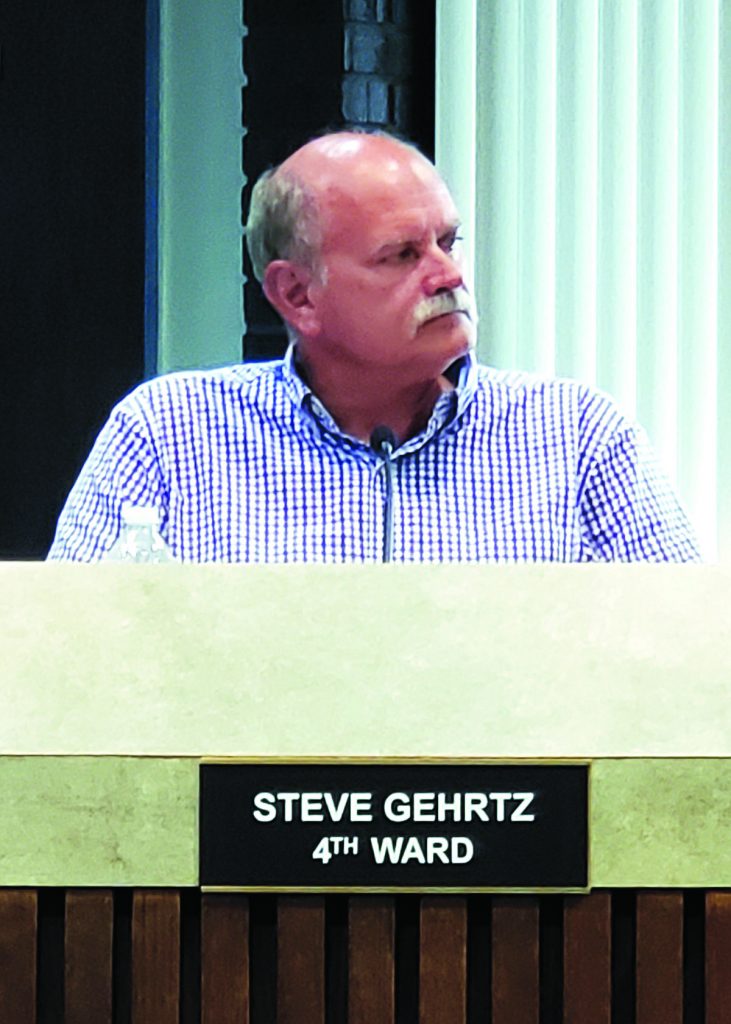
Nancy Edmonds Hanson
hansonnanc@gmail.com
An otherwise low-key Moorhead City Council meeting Monday ended with a bang – the resignation of Ward 4 council member Steve Gehrtz.
After an evening discussing unpaid administrative penalties and results of the recent legislative session, Gehrtz spoke up, announcing he would resign his seat on the eight-member board on Aug. 15. He cited the pressures of finding a “healthy balance” between his booming construction business, public service and his family life.
“I’m proud to see the progress Moorhead has made in the years I’ve served,” he told his colleagues, who appeared to be caught by surprise. Afterwards, he noted the change in attitude he sees in the city, particularly in economic development. “We’ve made some changes. The city now says, ‘How can we make this happen?’ instead of ‘We’ve never done that before,’” he commented. “That attitude has spurred new interest among developers, businesses and in the city itself.”
He added, “My primary reason is a really, really heavy workload. I have to keep an eye on that.” In addition to a number of major Moorhead projects – the Cullen Hockey Arena, Moorhead School District Operations Center and Eventide expansion among others – his firm is involved in major developments in West Fargo (The Lights on Sheyenne Street and 32nd Avenue South) and four projects totaling $50 million in the Detroit Lakes School District.
After other council members and Mayor Johnathan Judd expressed their sadness at his departure, city attorney John Shockley suggested the council leave Gehrtz’ seat vacant until the next city election in November, when a school bond issue is expected to be on the ballot. He noted that in recent years the council’s decision to fill a vacant seat by appointment was received badly by many residents.
Border Cities added to
permanent state budget
Governmental affairs director Lisa Bode shared some good news from the recent Minnesota legislative session with the council: Funding the Border City Enterprise Zone Program has been added to the permanent budget. That means Moorhead will receive the lion’s share of $750,000 per year with four other cities along the North Dakota-Minnesota border, or $525,000, with the balance allotted to East Grand Forks, Dilworth, Breckenridge and Ortonville. The funds are used to help Minnesota-based businesses overcome disparities with North Dakota laws and levies, which are generally lower.
Border Cities’ allocations have been made on a year-to-year basis since the program began in 1983, economic development administrator Amy Thorpe pointed out. “That’s made it difficult to tell businesses what to expect,” she said. The largest portion of the appropriations, which have brought $16 million to Moorhead in the 35 years since inception, is dedicated to the workers compensation rebate program, which offers businesses a credit for 25% of the higher fees charged in Minnesota up to a cap of $25,000, totaling between $350 and $400 thousand in 2019. The funding is also used to support other initiatives to modify disparities between the two states. Thorpe said the city plans to survey businesses, including those with smaller staffs than the 120 to 130 who currently apply for the tax credits, for ideas on other ways in which assistance could assist them in remaining and growing in Moorhead.
Nuisance penalties okayed
When the city receives complaints about how properties are maintained, the owners are notified of the need to remove the snow, mow the lawn, trim the trees and otherwise take care of the problem. Most do. “But a very small number of property owners don’t take action,” community planning director Kristie Leshovsky told the council. Then the city steps in, hires a contractor to do the work … and charges the property owner for the work plus an administrative fee. She asked the council to approve special assessments totaling more than $47,000 for 2018.
Council members questioned her about whether the owners of rental properties might not have been informed of the notices by their renters. She said she will provide them with a the break-down of the types of properties targeted for the special assessments, adding, “I think you’ll be surprised at the number of owner-occupied properties on the list.” Foreclosures present special difficulties, she said, since it’s hard to determine a point of contact for those now owned by banks.


